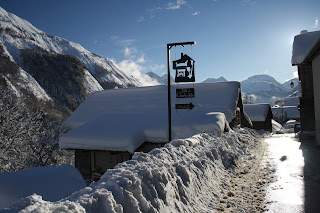On our last night Magali invites us to join her group in a night-time walk in the snow to a farmhouse for supper. The moon is almost full and the light in the woods is incredible - the villages across the valley seem quite near. There has not been much fresh snow and at night it is frozen and has become crunchy underfoot. As we climb up the hillside the sound of snow-shoes is deafening. We eat a hearty meal at the farm - even Jean-Baptiste looks replete - before returning at around midnight.
We have asked Jean-Baptiste if he can take us to Briancon in his car, over the Col de Lautaret which is just over 2000m to catch a train out of the mountains. There is snow falling when we leave and we begin to wonder about the wisdom of taking this route as we start to climb to the pass. The road is covered in snow but there is traffic in both directions. Over the pass on the way down to Briancon the road becomes quite indistinct. We just edge the tarmac and as Jean-Baptiste corrects the steering we suddenly enter into a slow-motion spin across the road. There's nothing we can do. The car turns almost 360 degrees and the back end hits the wall of snow on the inside of the road. I say the inside - on the other side is the drop into the valley. The bikes on the back of the car push the back window in. Horrible. I have to confess that at this point I was also wondering if the bikes could possibly have survived but they have. Fortunately the road was empty when we danced across it. Jean-Baptiste seems very phlegmatic. We are appalled that we have drawn him out on such a foul day only for this to happen.
We get to Briancon, unload the bikes - they have a couple of dented racks but seem okay - and quickly get our tickets. The train is sitting on the track. The snow is still falling and we know that Jean-Baptiste has yet to drive home back over the pass, with a dent in his car and no back window - the cost of doing us a favour. We feel lousy about the situation but we can't undo it. We say our goodbyes and the train is soon heading southwards out of the mountains and out of the snow.
We have asked Jean-Baptiste if he can take us to Briancon in his car, over the Col de Lautaret which is just over 2000m to catch a train out of the mountains. There is snow falling when we leave and we begin to wonder about the wisdom of taking this route as we start to climb to the pass. The road is covered in snow but there is traffic in both directions. Over the pass on the way down to Briancon the road becomes quite indistinct. We just edge the tarmac and as Jean-Baptiste corrects the steering we suddenly enter into a slow-motion spin across the road. There's nothing we can do. The car turns almost 360 degrees and the back end hits the wall of snow on the inside of the road. I say the inside - on the other side is the drop into the valley. The bikes on the back of the car push the back window in. Horrible. I have to confess that at this point I was also wondering if the bikes could possibly have survived but they have. Fortunately the road was empty when we danced across it. Jean-Baptiste seems very phlegmatic. We are appalled that we have drawn him out on such a foul day only for this to happen.
We get to Briancon, unload the bikes - they have a couple of dented racks but seem okay - and quickly get our tickets. The train is sitting on the track. The snow is still falling and we know that Jean-Baptiste has yet to drive home back over the pass, with a dent in his car and no back window - the cost of doing us a favour. We feel lousy about the situation but we can't undo it. We say our goodbyes and the train is soon heading southwards out of the mountains and out of the snow.














































